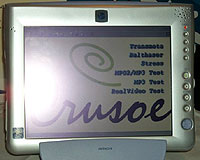Web Pads, IAs and Transmeta's shifting focus
 Anyone who's has been
watching Transmeta lately may have noticed a significant shift in their
interests. Just over a year ago when Transmeta first broke the news
about the very sleek software powered processor named Crusoe it was clear
where the Santa Clara companies' focus was. Web Pads, Internet Appliances and
the like.
Anyone who's has been
watching Transmeta lately may have noticed a significant shift in their
interests. Just over a year ago when Transmeta first broke the news
about the very sleek software powered processor named Crusoe it was clear
where the Santa Clara companies' focus was. Web Pads, Internet Appliances and
the like.
Indeed a host of prototype webpads were showcased
at that event, in conjunction with Mobile Linux, Transmeta's own special blend
of Linux. The duo was thought to be unstoppable - an ultra-efficient
processor, and an ultra-light operating system -what more could anyone ask
for?
Fast forward a year and you'll notice that not one
WebPad has made it to mass market with a Crusoe inside. Instead a host of
sub-notebooks have been popping up on an almost monthly basis, and now even
Transmeta Crusoe-based servers are set to hit the retail market. So what's
happening to the WebPad's?
 Apparently not much. In response to this posture
within the industry, Transmeta seems to quietly be moving its' focus towards the
notebook market. One of the main reasons is the simple cost of building a
webpad. The cost of components and the infrastructure is just too high right now
to make the webpad market viable on a consumer level. Consumers tend to demand
the most amount of features they can get for their money as a rule. However most
of the webpads proposed for the retail market simply lack the features necessary
to build strong consumer loyalty or even demand.
Apparently not much. In response to this posture
within the industry, Transmeta seems to quietly be moving its' focus towards the
notebook market. One of the main reasons is the simple cost of building a
webpad. The cost of components and the infrastructure is just too high right now
to make the webpad market viable on a consumer level. Consumers tend to demand
the most amount of features they can get for their money as a rule. However most
of the webpads proposed for the retail market simply lack the features necessary
to build strong consumer loyalty or even demand.
After all who would want to buy a product that only
allows you to surf the web and send email, but still costs a pretty
penny? Is the preemptive demise of the WebPad a simple case of
lacking feature sets?
Well, almost... What the mobile industry has done
is refocus the webpad towards satisfying the needs of the vertical markets. In
this arena the apparent lack of features from a consumer standpoint are
no longer restrictive, but positive variables.
For instance, while a home user would feel
restricted using a webpad that only gave them limited functionality
(and at a cost comparable to a mid-level desktop) a vertical manufacturer
morphing that same unit into a digital data pad for a hospital or museum
would be right on target. That is apparently how Transmeta sees it right
now.
The down side is that a product destined for the
vertical markets will never be able to meet the same level of demand as a
unit destined for the mass retail market. A VAR product may move 30,000 Crusoe
processors, but a product heading into eager consumer hands may move thirty
million.
That is exactly why the focus for Crusoe is
shifting towards the Windows-based notebook market. Considering the recent
developments with heavyweights Dell and Compaq, the over-saturated desktop
market seems just about ready to burst, leaving the venerable notebook market
ripe for the taking.... that is of course if Crusoe-based notebooks can
penetrate the North American market enough to make it to store shelves.

